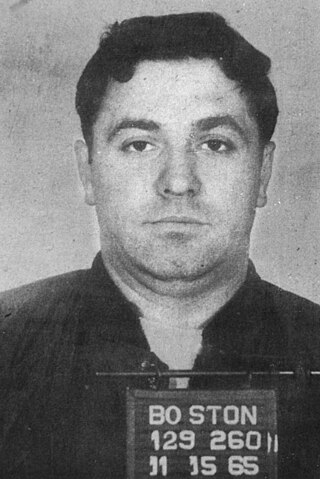Related Research Articles

William Michael Bulger is an American former Democratic politician, lawyer, and educator from South Boston, Massachusetts. His eighteen-year tenure as President of the Massachusetts Senate is the longest in history. After leaving office, he became president of the University of Massachusetts.

James Joseph "Whitey" Bulger Jr. was an American organized crime boss who led the Winter Hill Gang, an Irish Mob group based in the Winter Hill neighborhood of Somerville, Massachusetts, northwest of Boston. On December 23, 1994, Bulger went into hiding after his former FBI handler, John Connolly, tipped him off about a pending RICO indictment against him. He remained at large for sixteen years. After his 2011 arrest, federal prosecutors tried Bulger for nineteen murders based on grand jury testimony from Kevin Weeks and other former criminal associates.

Howard Louis Carr Jr. is an American conservative radio talk-show host, political author, news reporter and award-winning writer.
The Winter Hill Gang was a loose confederation of American organized crime figures in the Boston, Massachusetts area. It was generally considered an Irish Mob organization, with most gang members and the leadership consisting predominantly of Irish-Americans, although some notable members, such as Stephen Flemmi and Johnny Martorano, are of Italian-American descent.

Stephen Joseph Flemmi is an American gangster and convicted murderer and was a close associate of Winter Hill Gang boss Whitey Bulger. Beginning in 1975, Flemmi was a top echelon informant for the Federal Bureau of Investigation (FBI).
The Irish Mob is a usually crime family–based ethnic collective of organized crime syndicates composed of primarily ethnic Irish members which operate primarily in Ireland, the United States, the United Kingdom, Canada and Australia, and have been in existence since the early 19th century. Originating in Irish-American street gangs – famously first depicted in Herbert Asbury's 1927 book, The Gangs of New York – the Irish Mob has appeared in most major U.S. and Canadian cities, especially in the Northeast and the urban industrial Midwest, including Boston, New York City, Philadelphia, Pittsburgh, Baltimore, Cleveland, and Chicago.

Howard Thomas Winter was an American mobster who was a boss of the Winter Hill Gang in Somerville, Massachusetts.
John Joseph Connolly Jr. is an American former FBI agent who was convicted of racketeering, obstruction of justice and murder charges stemming from his relationship with Boston mobsters James "Whitey" Bulger, Steve Flemmi and the Winter Hill Gang.

The Friends of Eddie Coyle, published in 1970, is the debut novel of George V. Higgins, then an Assistant United States Attorney in Boston. The novel is a realistic depiction of the Irish-American underworld in Boston. Its central character is the title character Eddie Coyle, a small-time criminal and informant.

Kevin Weeks is an American former mobster and longtime friend and mob lieutenant to Whitey Bulger, the infamous boss of the Winter Hill Gang, a crime family based in the Winter Hill neighborhood of Somerville, Massachusetts.
John "Red" Shea is an American former mobster from Boston involved in narcotics and an associate of crime kingpin Whitey Bulger and the Winter Hill Gang during the 1980s and 1990s. He was indicted on cocaine trafficking charges in 1990 and served 12 years in prison.
Patrick Joseph Nee is an Irish-American former mobster and Irish republican sympathizer. A former member of the Mullen Gang and the Winter Hill Gang, he is a Vietnam War veteran, and author of A Criminal and an Irishman; The Inside Story of the Boston Mob-IRA Connection.
Donald Killeen was an American mob boss who controlled criminal activity, primarily bookmaking, loansharking, and numbers in South Boston, during the late 1940s to the early 1970s.
Paul McGonagle Sr. was an Irish-American mobster and leader of the Mullen Gang, a South Boston street crew involved in burglary and armed robbery.
The Mullen Gang was an Irish-American gang operating in Boston.
John Vincent Martorano is an American former gangster and former hitman for the Winter Hill Gang in Boston, Massachusetts, who has admitted to 20 mob-related killings.
Timothy A. Connolly III, aka "Timmy Connolly" and "TC", was an American former South Boston bar owner and mortgage broker, who wore a wire inside the infamous Winter Hill Gang and helped the federal government indict their two leaders, James "Whitey" Bulger and Stephen Flemmi. The public was led to believe that Tim Connolly was merely a businessman and an innocent victim of one of Jim Bulger's many extortions. But in truth, Tim Connolly was secretly a "made member" of the Winter Hill gang and a high ranking lieutenant in this Bulger crime family.
William S. O'Sullivan was an American loanshark and longtime enforcer for Donald Killeen, the head of the Irish mob in South Boston, Massachusetts. O'Sullivan also acted as a mentor to a young James J. Bulger, who grew up to become the leader of Boston's Winter Hill Gang.

Black Mass is a 2015 American biographical crime drama film about American mobster Whitey Bulger. Directed by Scott Cooper and written by Mark Mallouk and Jez Butterworth, it is based on Dick Lehr and Gerard O'Neill's 2000 book Black Mass: The True Story of an Unholy Alliance Between the FBI and the Irish Mob. The film features an ensemble cast led by Johnny Depp as Bulger, alongside Joel Edgerton, Benedict Cumberbatch, Kevin Bacon, Jesse Plemons, Peter Sarsgaard, Dakota Johnson, and Corey Stoll.
Fotios "Freddy" Geas is an American criminal and an associate of the Genovese crime family, based in New York City. He is a former Mafia hitman and gang enforcer operating out of Springfield, Massachusetts and often worked with his brother Ty Geas.
References
- ↑ Coogan, Tim Pat (16 December 2015). Wherever Green is Worn: The Story of the Irish Diaspora. Head of Zeus Ltd. ISBN 9781784975395.
- ↑ Cullen, Kevin; Murphy, Shelley (2013). Whitey Bulger : America's most wanted gangster and the manhunt that brought him to justice (First ed.). New York: Norton & Company, Incorporated, W.W. p. 90. ISBN 9780393087727.